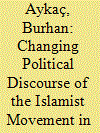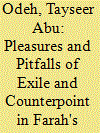| Srl | Item |
| 1 |
ID:
161092


|
|
|
|
|
| Summary/Abstract |
Abd al-Wahhab al-Bayati is one of the most prominent twentieth-century Arab poets. His poetry makes a drastic shift from politically committed in the 1950s and 1960s to metapoetic in the 1970s onward. In his post-Nasserist works, al-Bayati interrogates the role of poets and the function of their poetry. This article explores some of the main metapoetic themes in al-Bayati's poem “Meditations on the Other Face of Love,” which was published in 1979. The article argues that al-Bayati consciously uses reflexive poetry as a platform to blur the line between poetry and literary criticism and to declare his discontent with the literary scene and the political status quo in the Arab world. The article also examines some of the poetry by Nizar Qabbani and Muzaffar al-Nawab, in relation to that of al-Bayati. These three poets provide a poetic discussion of “terrorism” against the hegemony of political discourse, and demand that Arab citizens reject their undignified lives by adopting resistance and rejecting terrorism.
|
|
|
|
|
|
|
|
|
|
|
|
|
|
|
|
| 2 |
ID:
161095


|
|
|
|
|
| Summary/Abstract |
This article deals with the Islamist movement and its ideology throughout the process of modernization and analyzes the political discourse of the Islamists about a world of consumption and the Islamic lifestyle. The article depicts the course of the Islamist political discourse from the beginning. The political discourse of the Islamists showed variations depending on the changing domestic and foreign conjunctions. Developed through a defensive understanding in the final period of the Ottoman State, the discourse of the Islamist movement underwent further changes in the following periods, which was influenced by the internal conditions of the country and developments outside. As the Islamist movement has always adapted to modern political life, political and intellectual changes in the modern period caused the Islamist discourse to change politically and acquire an appropriate language for the new situation.
|
|
|
|
|
|
|
|
|
|
|
|
|
|
|
|
| 3 |
ID:
161094


|
|
|
|
|
| Summary/Abstract |
Taking as its starting point Edward Said's appropriation of the concept of counterpoint, late style, and exile in Culture and Imperialism and On Late Style, this essay examines the thematic and literary implications of Nuruddin Farah's counterpoint and exile, as manifested in Maps. More concretely, building on Said's secular and humanist examination of counterpoint, late style, and exile as embodying a form of musical, aesthetic and sociopolitical criticism and resistance, this essay examines the way in which Nuruddin Farah addresses the aesthetic and home in Somalia as a counterpoint to the dictatorial masculine oppression of the regime from a contrapuntal and exilic perspective. The theme of postcolonial transnational feminism as a contrapuntal sign of resistance and late style is examined and interrogated in Farah's Maps in various ways. I investigate contrapuntally the way in which Somalian women, as portrayed in Farah's selected works, stand up to challenge the hegemonic patriarch and postcolonial regime in Somalia, as represented by the General Siad Barre and the oligarchy. Somalian female identity foregrounds itself in a pertinent and humanist way within a postcolonial feminist context.
|
|
|
|
|
|
|
|
|
|
|
|
|
|
|
|
| 4 |
ID:
161093


|
|
|
|
|
| Summary/Abstract |
This article looks into the meaning of Tahrir Square before, during, and after the January 25 revolution. We employ Lefebvre's conceptual triad of space to understand how space is not merely a physical form, but also the product of relations between natural and social objects in this space. To understand how these relations changed dramatically after January 25, we will draw on Sewell's insight into how space is a constituent aspect of contentious politics. We discuss the way in which the political space of Tahrir Square went through distinct phases during and after the Egyptian revolution, from counter-space, to eventually a change in the conceived space of Tahrir Square, but not according to the principles of the newly created lived space during the 18 days.
|
|
|
|
|
|
|
|
|
|
|
|
|
|
|
|